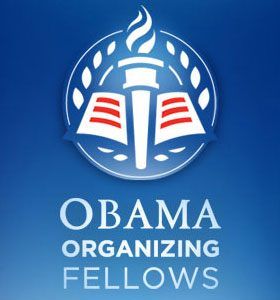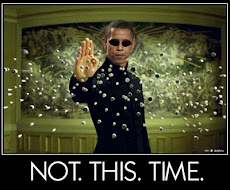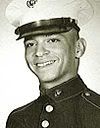
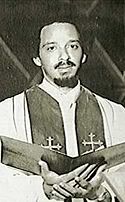
The rebellious son of a Baptist minister, Rev. Jeremiah Wright was hired by Trinity United Church of Christ in 1972 when he could find no Baptist church to take him. The congregation on 95th Street had recently adopted the motto "Unashamedly black and unapologetically Christian" and did not mind his fiery red Afro and black power agenda. Wright now leads the nation's largest UCC congregation. Members include hip-hop artist Common and Democratic presidential candidate U.S. Sen. Barack Obama. Obama based his keynote speech to the 2004 Democratic... 
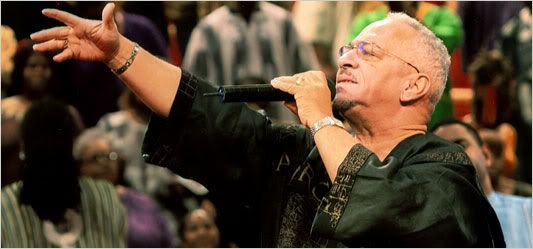
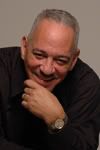
REV. JEREMIAH A. WRIGHT, JR.: Pastor inspires Obama's 'audacity'
By Manya A. Brachear | Tribune religion reporter
January 21, 2007
When he took over Trinity United Church of Christ in 1972, Rev. Jeremiah Wright Jr. was a maverick pastor with a wardrobe of dashikis and a militant message.
Six years later, he planted a "Free South Africa" sign on the lawn of his church and asked other local religious leaders to follow his lead.
None took him up on the invitation.
The sign stayed until the end of apartheid, --long enough to catch the eye of a young Barack Obama, who visited the church in 1985 as a community activist. Obama, was not a churchgoer at the time, but he found himself returning to the sanctuary of Trinity United. In Wright he had found both a spiritual mentor and a role model.
Wright, 65, is a straight-talking pragmatist who arrived in Chicago as an outsider and became an institution. He has built a congregation of 8,500, including the likes of Oprah Winfrey and hip-hop artist Common, by offering an alternative to socially conservative black churches that are, Wright believes, too closely tied to Chicago's political dynasties.
Obama, too, also came to the city as a young unknown. Emerging from relative obscurity with his win in the Democratic U.S. Senate primary race for a U.S. Senate seat, he found a growing audience by preaching the politics of social justice and common ground. He has encouraged Democrats to acknowledge the power of faith in the lives of Americans. Now, he is positioning himself as a presidential candidate who can unify the American people.
Obama says that rather than advising him on strategy, Wright helps keep his priorities straight and his moral compass calibrated.
"What I value most about Pastor Wright is not his day-to-day political advice," Obama said. "He's much more of a sounding board for me to make sure that I am speaking as truthfully about what I believe as possible and that I'm not losing myself in some of the hype and hoopla and stress that's involved in national politics."
The rebellious son of a Baptist minister, Wright was hired by Trinity United when he could find no Baptist church to take him. The congregation on 95th Street, then numbering just 87, had recently adopted the motto "Unashamedly black and unapologetically Christian." They did not mind his fiery red Afro and black power agenda.
Wright has continued on an independent path ever since, often questioning the common sense of Scripture, objecting to mandatory prayer in schools and clashing with clergy who preach prosperity theology, a popular notion among black pastors that God will bestow wealth and success on believers.
In the process, he built a spiritual empire. The modest brown brick building that housed the church in the 1970s was converted into a day-care center when Trinity opened its new sanctuary in 1995 at 400 W. 95th St. Members run more than 80 ministries, including an outreach to gay and lesbian singles, --also unusual for a black church.
And though Wright now wears three-piece suits on occasion, but he still dons a dashiki most times he preaches. Obama has said he is particularly inspired by Wright's ability to draw followers from all walks of life--celebrities and welfare recipients, PhDs and GEDs. It is a gift the senator aspires to emulate.
Wright again bucked convention by announcing plans to retire in May 2008 and tapping Rev. Otis Moss III as his successor. Many black pastors do not surrender their pulpit even when they become too feeble to serve, said Rev. Dwight Hopkins, a professor at the University of Chicago Divinity School who met Wright in the 1980s.
Wright's willingness to "surrender leadership" demonstrates a humility that sets him apart, Hopkins said.
"The black church is probably the only space in America where black men can have unquestioned authority," he said. "It's hard to give that up for a lot of black male pastors."
Wright said the decision was not hard difficult. "The church is built around the personality of Jesus, not Jeremiah Wright," he said.
Born and raised in Philadelphia, Wright followed in the footsteps of his father and grandfather and enrolled at by attending Virginia Union University, with the intention of doing graduate work at the historically black seminary. But disenchanted by what he felt was an inadequate Christian response to the civil rights movement, he abruptly ended his pastoral pursuits and joined the U.S. Navy.
An encounter with a pastor as he loitered on some church steps reminded Wright of his calling. He eventually returned to Howard University to finish bachelor's and master's degrees in English with a focus on African spirituals. At the University of Chicago Divinity School, he earned another master's in the history of religions with a focus on Islam. He planned to earn a doctoral degree his Ph.D. and teach at a seminary.
But his calling to teach was interrupted by a call to action. Many black Christians were leaving the church for other religious traditions, including the Black Hebrew Israelites and the Nation of Islam, who taught that Christianity was a white man's religion imposed on them by slaveholders.
"They didn't know African-American history," Wright said. "They were leaving the churches by the boatloads ¡K The church seemed so disconnected from their struggle for dignity and humanity."
Wright set out to show young people how other major religions also participated in the slave trade, how many abolitionists were Christians and how Jesus' concern for the oppressed related to the struggles of the black community.
To do that, he needed a pulpit and found one at Trinity, which needed a leader to match its new motto and new attitude.
"Many of us who had grown up in very traditional denominations were all transformed by the civil rights movement and were beginning to question how our faith intersected with our actions," said longtime Trinity member Iva Carruthers, who is helping Wright launch a church grammar school.
Wright sought to build on the black theology of liberation introduced in 1968 by Rev. James Cone of New York, by emphasizing Africa's contribution to Christianity rather than that of mainstream white theologians.
"To show there is an independent form of thinking there about religion that stands on its own, that's really more life-giving than what you get from Europe," Cone said. "Black people who come from that approach have a very healthy understanding of who they are."
To bolster that pride, Wright takes members of his flock to different African nations every year. Wright also encourages youths in the congregation to attend historically black colleges and universities, sponsoring a scholarship fair each year.
The success of Trinity did not come without sacrifice.
"Growing up in the church was kind of bittersweet," said Wright's daughter Jeri, who developed a church publication into the nationally distributed Trumpet magazine. "That's when his daily life consisted of his service to God's people. I've always loved going to church and going to worship. At the same time I felt my church took my father from me."
She credits her mother, Janet, for helping her understand.
"It was my mother that taught us to separate the man from the ministry," his daughter said. "No matter what happened in our lives, she never wanted us to have any ill feelings toward the church or toward our father. `Yes, he is your father, but when he steps behind that sacred desk he is God's messenger, and never confuse the two.'ƒ|"
It was a harder lesson to live. Janet and Jeremiah Wright eventually divorced, --which the pastor describes as his greatest failure. He has since remarried and had another daughter, Jamila, and with his wife, Ramah, he sees a counselor regularly.
He hides none of this from his congregation, despite the persistent whispering since his divorce.
"He's not a hypocrite," Hopkins said. "You know what he says behind closed doors, he'll say in the pulpit."
"People expect him to be God. They expect him to be Jesus," said Jeri Wright said. "The reality is, he's human. He has the same hurt, the same pains, the same issues as those that come and sit under the sound of his voice every Sunday." That dose of reality is what keeps Lonnie Rashid Lynn Jr., known in the to hip-hop world as Common, coming back to Trinity.
"That's one of the greatest attributes I love about him," said Common, who grew up in the church. "He falls victim to the same things ¡K He brings balance to the pulpit. He didn't just create an image."
In his 1993 memoir "Dreams from My Father," Obama recounts in vivid detail his first meeting with Wright in 1985. The pastor warned the community activist that getting involved with Trinity might turn off other black clergy because of the church's radical reputation.
When Obama sought his own church community, he felt increasingly at home at Trinity. Before leaving for Harvard Law School in 1988, he responded to one of Wright's altar calls and declared a personal relationship with Jesus Christ.
Later he would base his 2004 keynote speech to the Democratic National Convention on a Wright sermon called "Audacity to Hope," --also the inspiration for Obama's second memoir, "The Audacity of Hope."
Though Wright and Obama do not often talk one-on-one often, the senator does check with his pastor before making any bold political moves.
Last fall, Obama approached Wright to broach the possibility of running for president. Wright cautioned Obama not to let politics change him, but he also encouraged Obama, win or lose.
Wright said, "Picture some kid who lives in Hyde Park or over in Ida B. Wells Homes or Washington Gardens, who will see Barack and say, `My God, I can be one day be that.' The amount of hope that it will give to kids who society has written off just in terms of them changing their concept of what is possible is going to be immeasurable for generations to come." ƒ| mbrachear@tribune.com
Tuesday, April 22, 2008
Subscribe to:
Posts (Atom)


































